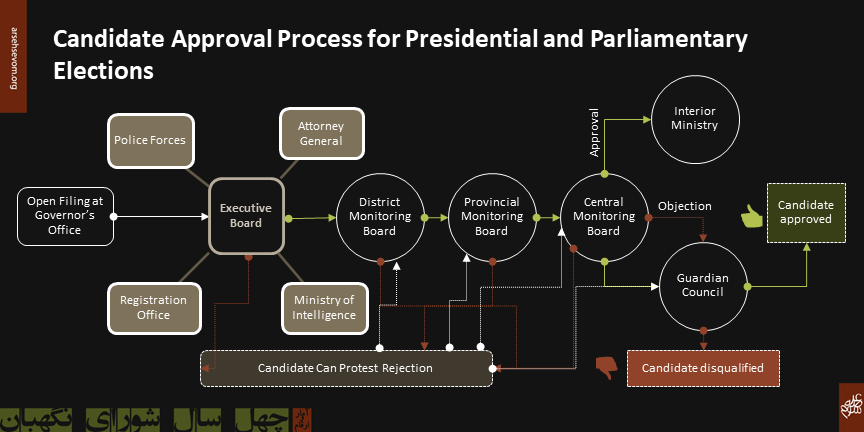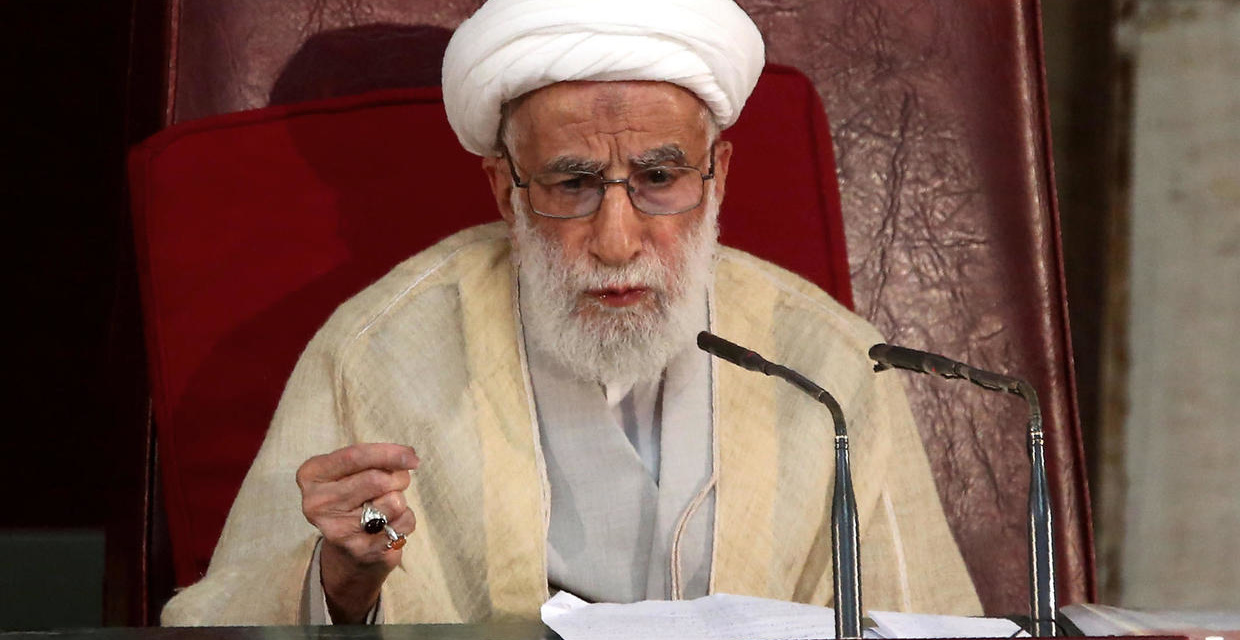Ayatollah Ahmad Jannati, the head of Iran’s Guardian Council
Author’s Note: This is an excerpt from the first of a series of articles about the Guardian Council, published by the civil society organization Arseh Sevom.
In its expansion of power over elections, overseen by the Supreme Leader, the Guardian Council is not merely a 12-member institution but has offices across the nation. Since 2001, it has extended surveillance and demands for ideological conformity from candidates.
In this month’s Parliamentary elections, the Council prevented the candidacy of almost every reform-minded or independent candidate. This includes rejecting the candidacy of 92 sitting MPs, many of whom are affiliated with the reformists or independents.
There is a recycle and reuse policy when it comes to members of unelected bodies. Serving on multiple committees and councils. their influence extends well beyond a single Presidential administration.
The Guardian Council has 12 members serving six-year terms. Six of the twelve are appointed by the Supreme Leader. The other six are selected by MPs from a pool of candidates named by the head of the judiciary, who in turn is appointed by the Supreme Leader.

The arrangement has ensured that over the past 40 years, the Guardian Council has been leveraged by the Supreme Leader to wield political power, keep the opposition at bay, and shape future leadership.
As the Guardian Council determines who can and cannot run for national office, what began as a system of competing powers that could be checked, has become lopsided. The Parliament voted to diminish its powers in the late 1990s, and the Supreme Leader’s office consolidated its own authority.
The notion that the Guardian Council is simply a board of 12 people – six clerics and six legal specialists – now seems quaint. With offices in every province of Iran, the Council oversees election monitoring boards that collect reams of information on potential candidates and activists. It receives advice on legislative oversight from a shadowy group of “respected clerics” who are unknown to the public.
The main purpose of the Guardian Council seems to be controlling access to power. It has become a micro-manager of elections through the development of election monitoring boards, which are neither independent nor impartial. These boards operate in every district. They don’t simply vet candidates to make sure that they meet the criteria set by the Islamic government, they surveil people who may one day become candidates.
- The offices and boards were established secretly without public knowledge
- The Election Monitoring Boards conduct illegal surveillance on people who may one day run as candidates, sometimes starting when people are still students
- The Election Monitoring Boards, in concert with the Guardian Council, have final say over which candidates are allowed to mount election campaigns
Key Dates
1981: The first post-revolution parliament approves the Parliamentary Election Observation Code, creating the Central Election Monitoring Board to be established by the Guardian Council
1982: The Presidential Election Monitoring Code is approved by Parliament
1989: Ayatollah Khomeini dies and Ali Khamenei is placed in power
2000: The Supreme Leader Ayatollah Khamenei calls for provincial offices of the Guardian Council:
You [Guardian Council] have to consolidate your work. You need a reliable, strong, and agile organization that is well prepared to take on tasks year-round. You should hire election monitors in proportion to the number of voters in all the important voting districts. You must have access to an information bank.”
2001: Election monitoring and observing is restructured and election monitoring boards answering to the Guardian Council are established. The political deputy of the Ministry of the Interior states, “These offices are funded from the public budget and conduct illegal research and investigations about potential candidates.”
2002: Provincial offices of the Guardian Council established
2019: In February, Hassan Rouhani’s government sent the Comprehensive Bill of Elections to Parliament to govern Parliamentary, Presidential, and Council elections. If this bill is approved by the Parliament, the composition of the monitoring boards will change dramatically once again. However, it was not passed before the March 2020 elections
The Candidate Approval Process
The decision-making process is multi-level. From the time a candidate files until the time they are vetted and approved, there are five boards reviewing their candidacy.
- A potential candidate files their intent to run for office at the Governor’s Office
- The filing is first reviewed by the Executive Board
- If approved, it’s passed on to the District Monitoring Board, then the Provincial Monitoring Board, then the Central Monitoring Board
- The Central Monitoring Board sends approved candidates to both the Interior Ministry and the Guardian Council. The Guardian Council makes the final decision and then makes the announcements
Power Over the Future of Power
The Guardian Council has grown more influential under the rule of Ayatollah Khamenei. It is much more than the 12 members overseeing elections and legislation. It is now a major power center, with surveillance capabilities, provincial offices, and ultimate oversight over national elections.
Potential candidates and activists are being identified before they even decide they want to run in an election. Surveillance on their activities begins when they are quite young.
Reformists are being shut out of the electoral cycle, with 92 MPs denied candidacy in the Parliamentary ballot. Meanwhile, the Election Monitoring Boards are offering fresh opportunities for corruption. Rejected candidates have been approached by brokers claiming to wield influence over the Guardian Council decision for the right price, with twelve people arrested this month.
This is all part of the increased institutional power of the Supreme Leader. By controlling access to the elections on the part of potential candidates and the way in which elections are run, the Guardian Council and Ayatollah Khamenei can exert control over both present and future power in Iran.
>Read the full post from Arseh Sevom


“Reformists are being shut out of the electoral cycle”
No. They are not. The Guardians council has no supervisory control of local elections held within Iran.
Also, there were more reformist candidates on the ballot in this Majlis election (160-200) as compared to 2016 when only 93 were approved.
Reformist candidates (Aref and Jahangiri) were approved for the 2013 and 2017 presidential elections, respectively.
Reformist candidates have, however, struggled to get approved for the Assembly of Experts elections.
Reza,
This post is nonsense, but thank you as always for writing.
S.
” Candidate Approval Process….” graph chart
That is a very cute!
But it is missing few boxes: where are the “shoot protesters in the face, shoot in the back, and 30yr prison sentences boxes?